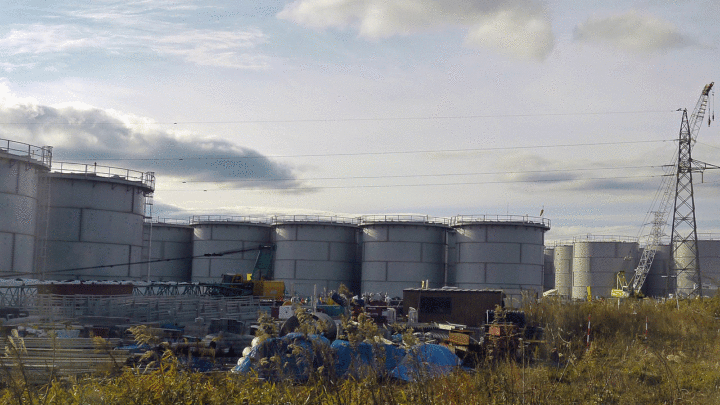By Linda Pentz Gunter for Beyond Nuclear International.
Many years ago, in what seems like another lifetime, I was a reporter on the tennis beat, walking through an airport with Martina Navratilova. The aroma of hot dogs wafted around, the one thing, as vegetarians, we agreed we missed.
But Navratilova was a proper vegetarian. I was still eating fish. “Fish have souls, too,” she admonished me.
More recently, Paul Watson of Sea Shepherd, and a co-founder of Greenpeace, wrote: “Seafood is simply a socially acceptable form of bush meat.”
Exposing our hypocrisy, he continued: “We condemn Africans for hunting monkeys and mammalian and bird species from the jungle yet the developed world thinks nothing of hauling in magnificent wild creatures like swordfish, tuna, halibut, shark, and salmon for our meals.
“The fact is that the global slaughter of marine wildlife is simply the largest massacre of wildlife on the planet.”
As we heard again in the news recently, TEPCO and the Japanese government are once more preparing to “dispose” of 1.25 million tonnes — translating to hundred of millions of gallons — of radioactive water accumulating at the Fukushima Daiichi nuclear power plant site by pouring it into the Pacific Ocean.
I say “accumulating” because this water, needed to constantly cool the stricken reactors that exploded and melted down during and after March 11, 2011 — and that also runs down neighboring hillsides and across the site, picking up radioactive contamination — will continue to accumulate. This is not a one-stop-toss.
Citizens groups and fishing unions have been up in arms about this ever since it was first mooted. The actual dumping of the water always seems to be about two years away, and is always threatened as the only “solution,” which it is not. It is almost certainly the cheapest solution, but not the only choice.
What disturbs most protesters is that the strontium, cesium and tritium that will be in that radioactive water (tritium cannot be separated and authorities have admitted they have so far failed to fully remove strontium and cesium), will, by bioaccumulating up the marine food chain, get into the food supply for human consumption.
It is, in our anthropocentric world, once again all about how it will hurt us.
“The greatness of a nation and its moral progress can be judged by the way its animals are treated,” wrote Gandhi. Yet we have almost never heeded this. Cows may be sacred in India, but many other domestic animals there lead a desperate life of neglect and cruelty. There are horrific factory farms and puppy mills in the US, bear bile farms in Vietnam, and wild animal markets in China — which may have brought us Covid-19. The Japanese still hunt whales. These are just examples. Cruelty toward animals is everywhere.

The thinking that only asks the question “how will dumping Fukushima’s radioactive water into the sea harm human health?” got us to where we are today. We are responsible for unending mass extinctions. We control the environment and habitat of all living things and we have recklessly and irresponsibly changed these for the worse for the animals who depend on them. In reality, we have mostly changed our environment for the worse for ourselves as well.
Even if we never ate the fish that comes out of the Pacific; and even if the fish and higher marine mammal predators never ate each other; contaminating sea life with radioactive toxins is wrong. We made it. Why dump it on creatures who had nothing whatever to do with its production and never needed to turn on a light?
This is not the only instance of total disregard for marine life when it comes to nuclear power. Just by using what is known as the “once-through” cooling intake system at coastal nuclear power plants, the toll on sea life is immense. Billions of fish, fingerlings and spawn are drawn into the plant with the cooling water (the water rate can be as high as a million gallons a minute) and duly pulverized. Their “remains” are discharged at the other end as sediment. No fishing license required. New nuclear power plants promise to be even bigger marine predators.
What to do with that radioactive water is a scientific dilemma, but it’s a moral question too. As a general rule, it is morally wrong to refuse to solve a problem we’ve created — in this case radioactive waste water resulting from our failure to control nuclear power — and then, when it becomes totally unmanageable, dump it on other living beings. Period.
And, it is morally wrong to make the problem worse — by continuing to use nuclear power and risking more Fukushimas — while also producing yet more radioactive waste, and then, finding no answers for the mess we’ve made, continuing to subject the lives of other people, and of animals, to its risks.
What to do at the Fukushima site instead? As we wrote in an earlier article: “According to Dr. M.V. Ramana, by far the best solution is to continue to store the radioactive water, even if that means moving some of the storage tanks to other locations to make more room for new ones at the nuclear site.”
But Japan wants to wash the contaminated water out of sight and out of mind. In the meantime, it is busy metaphorically cleansing itself of the Fukushima accident with a number of measures designed to make the Summer Olympics there — postponed from 2020 but still scheduled for this summer — more palatable.
But, as activists from Youngsolwara Pacific wrote on these pages also this week, “the Pacific Ocean is NOT Japan’s dumpsite for nuclear waste!” Nor should it ever be.










